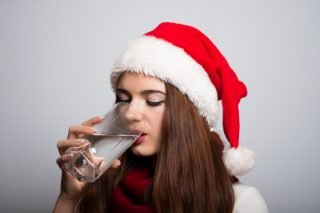We’ve all been there…you had a bit too much to drink the night before and you’ve woken up with the dreaded hangover. Over December, there seems to be nothing except drinks and dinner parties. With all the festivities that surround the holiday season, it’s really no surprise that we can all have a tendency to overdo it a bit when it comes to drinks. But what causes hangovers and what can you do if (when) you get one?
Why does drinking cause hangovers anyway?

Photo by cottonbro from Pexels
Although we all know that alcohol can cause hangovers, the scientific community has yet to come up with a clear and convincing explanation that explains why this happens.
Currently, the most plausible explanation is that alcohol causes dehydration. However, some research seems to suggest that the alcohol itself might not be to blame. Instead, it’s the diuretic and/or dehydrating effects of alcohol that cause the most hangover symptoms. This dehydration comes as a direct result of acetaldehyde, which is a toxic byproduct of alcohol that is metabolized. Because alcohol is a diuretic, it can cause you to become dehydrated much more quickly. This dehydration causes headaches, dizziness, and thirst.
Drinking alcohol can also cause acid production in the digestive system. It can also either speed up or slow the passage of food particles through the gastrointestinal tract. This can cause symptoms like nausea, vomiting, and diarrhea.
Drinking alcohol also has a negative (but temporary) effect on the immune system. According to Healthline, “nausea, decreased appetite, and inability to concentrate may be related to temporary changes in immune system function”. Drinking too much can also have a negative impact on your sleep. Though it may cause you to feel sleepy, it inhibits good sleep. You are more likely to wake up during the night after a night of heavy drinking. You’ll also likely feel more tired the next day.
What are the symptoms of a hangover?
Typically, according to Mayo Clinic, hangover symptoms only appear once your blood alcohol level drops significantly. This is usually the morning after a night of drinking. The symptoms and the severity of the symptoms is dependent on what and how much you drink. However, Mayo Clinic lists hangover symptoms as:
- Fatigue and weakness
- Excessive thirst and dry mouth

Photo by Polina Tankilevitch from Pexels
- Headaches and muscle aches
- Nausea, vomiting, or stomach pain
- Poor or decreased sleep
- Increased sensitivity to light and sound
- Dizziness or a sense of the room spinning
- Shakiness
- Decreased ability to concentrate
- Mood disturbances, such as depression, anxiety, and irritability
- Rapid heartbeat
These tips should help you recover from a big night

Medvid.com/Shutterstock
Unfortunately, there’s not much research being conducted on the various hangover cures out there. However, the following tips should at least help you to recover a bit faster and more effectively from your big night.
Stay hydrated: try to drink water either in-between drinks or alongside your drinks. Alcohol dehydrates you, so keeping your hydration levels up is vital. Once you get home (especially if you know you’ve had a bit too much to drink), use a powdered form of electrolytes dissolved in water to help rehydrate your body.
Eat right: A great way to rid yourself of a hangover is by making a smoothie that combines complex carbohydrates with powerful anti-inflammatory nutrients. If you can’t resist the urge to eat some greasy foods, try incorporating some healthy options into your diet, such as protein in the form of eggs, veggies like spinach, and a side of fruit.
Try some natural alternatives: Drinking some ginger tea could be a really good idea. Ginger tea is full of anti-inflammatory compounds and can help to settle an upset stomach and settle nausea.
How can you help to prevent a hangover? Drink in moderation
But how much is too much?
In the United States, a standard drink constitutes
- 12-ounces (about 350 ml) of beer (5% alcohol content)
- 8-ounces (about 230 ml) of malt liquor (7% alcohol content)
- 5-ounces of wine (about 230 ml) (12% alcohol content)

Photo by Nicole Michalou from Pexels
- 1.5-ounces of 80-proof (about 44 ml) (40% alcohol content) distilled spirits or liquor (e.g., gin, rum, vodka, whiskey)
Excessive drinking, including binge drinking, is classified as:
- For women, 4 or more drinks during a single occasion
- For men, 5 or more drinks during a single occasion
- Heavy drinking is defined as consuming
- For women, 8 or more drinks per week
- For men, 15 or more drinks per week
*Information courtesy of the CDC
Drink more moderately and more mindfully
- Water intake is even more vital when you’re consuming alcohol as it can dehydrate the body.
- Try not to drink on an empty stomach. We all know it can be tempting not to eat so you look particularly great in your dress. But having something in your system can really help your body to cope with the alcohol. Good fats and proteins in foods like tuna, avocado, and bananas can slow the rate of absorption of alcohol into the blood. This means you will be able to enjoy the party longer.
- Add some cool drinks, fruit juices, water, or non-alcoholic alternatives. This just allows your body to regain some more energy and hydration.
- Whilst cocktails may seem like a fantastic idea at the start of the evening, it’s likely that you’ll regret mixing drinks. You tend to get drunk faster when you mix your spirits.
References
https://www.cdc.gov/alcohol/fact-sheets/alcohol-use.htm
https://alcoholthinkagain.com.au/alcohol-your-community/the-festive-season/
https://www.mayoclinic.org/diseases-conditions/hangovers/symptoms-causes/syc-20373012
https://www.healthline.com/health/what-causes-a-hangover
https://www.naturalgrocers.com/health-hotline-article/easy-way-cure-your-overindulgence
http://www.mdpi.com/1420-3049/21/1/64/htm#B9-molecules-21-00064External link 301







![women [longevity live]](https://longevitylive.com/wp-content/uploads/2020/01/photo-of-women-walking-down-the-street-1116984-100x100.jpg)









